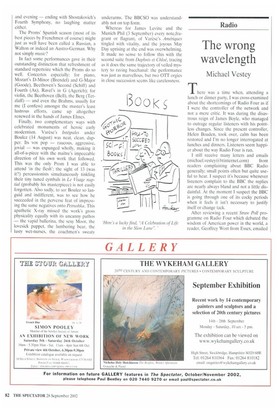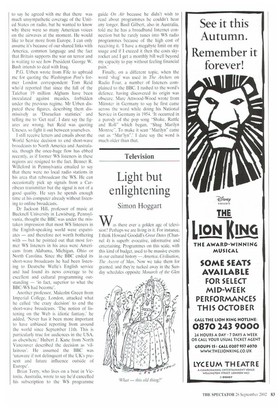The wrong wavelength
Michael Vestey
There was a time when, attending a lunch or dinner party, I was cross-examined about the shortcomings of Radio Four as if I were the controller of the network and not a mere critic. It was during the disastrous reign of James Boyle, who managed to outrage regular listeners with his pointless changes. Since the present controller, Helen Boaden, took over, calm has been restored and I'm no longer interrogated at lunches and dinners. Listeners seem happier about the way Radio Four is run.
I still receive many letters and emails
(michaeLvestey@btinternet.com) from readers complaining about BBC Radio generally; small points often but quite useful to hear. I suspect it's because whenever listeners complain to the BBC the replies are nearly always bland and not a little disdainful. At the moment I suspect the BBC is going through one of its cocky periods when it feels it isn't necessary to justify itself or change tack.
After reviewing a recent Straw Poll programme on Radio Four which debated the wisdom of American power in the world, a reader, Geoffrey Wort from Essex, emailed
to say he agreed with me that there was much unsympathetic coverage of the United States on radio, but he wanted to know why there were so many American voices on the airwaves at the moment. He would like to hear more from Europe. I can only assume it's because of our shared links with America, common language and the fact that Britain supports the war on terror and is waiting to see how President George W. Bush intends to deal with Iraq,
P.G. Urben wrote from Fife to upbraid me for quoting the Washington Post's for
mer London correspondent Tom Reid who'd reported that since the fall of the Taleban 19 million Afghans have been inoculated against measles, forbidden under the previous regime. Mr Urben disputed these figures, describing them dis missively as 'Disraelian statistics' and telling me to 'Get real'. I dare say the figures are wrong, but Reid was quoting Unesco, so fight it out between yourselves.
I still receive letters and emails about the World Service decision to end short-wave broadcasts to North America and Australa sia, though the once-huge flow has ebbed recently, as if former WS listeners in these regions are resigned to the fact. Bennet R.
Willeford in Pennsylvania emailed to say that there were no local radio stations in his area that rebroadcast the WS. He can occasionally pick up signals from a Carribean transmitter but the signal is not of a good quality. He says he spends enough time at his computer already without listening to online broadcasts.
Dr Jackson Hill, professor of music at Bucknell University in Lewisburg, Pennsyl vania, thought the BBC was under the mis taken impression that most WS listeners in the English-speaking world were expatri ates — and therefore not worth bothering with — but he pointed out that most former WS listeners in his area were Ameri cans from Alabama, Michigan, Ohio or North Carolina. Since the BBC ended its short-wave broadcasts he had been listen ing to Deutsche Welle's English service and had found its news coverage to be excellent and cultural programming outstanding — 'in fact, superior to what the BBC-WS had become'.
Another professor, Malcolm Green from Imperial College, London, attacked what he called 'the crazy decision' to end the short-wave broadcasts. 'The notion of listening on the Web is idiotic fantasy,' he added, 'Never has it been more important to have unbiased reporting from around the world since September 11th, This is particularly true for audiences in the USA, as elsewhere.' Hubert J. Kane from North Vancouver described the decision as 'vil lainous'. He assumed the BBC was 'unaware if not delinquent of the UK's present and future influence outside of Europe'.
Brian Terry, who lives on a boat in Victoria, Australia, wrote to say he'd cancelled his subscription to the WS programme guide On Air because he didn't wish to read about programmes he couldn't hear any longer. Basil Gilbert, also in Australia, told me he has a broadband Internet connection hut he rarely tunes into WS radio programmes because of the high cost of receiving it. 'I have a megabyte limit on my usage and if I exceed it then the costs skyrocket and I get a monthly bill well beyond my capacity to pay without feeling financial pain.'
Finally, on a different topic, when the word 'shag' was used in The Archers on Radio Four, a number of listeners complained to the BBC. I rushed to the word's defence, having discovered its origin was obscure. Marc Attwood-Wood wrote from Munster in Germany to say he first came across the word while doing his National Service in Germany in 1954. 'It occurred in a parody of the pop song "Shake, Rattle and Roll" which began, "Shag Marilyn Monroe". To make it scan "Marilyn" came out as -Marlyn": I dare say the word is much older than that.



































































































 Previous page
Previous page